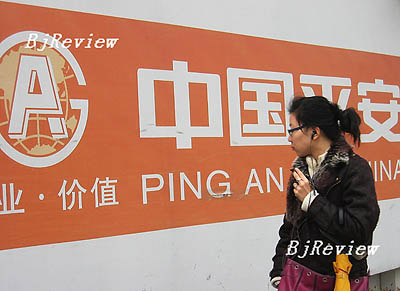|

Ping An of China has been made the main scapegoat of this year's stock market plunge. A month after its refinancing plan announcement-equivalent to recreating a new Ping An-its 3.12 billion restricted shares were made tradable on March 3, accounting for almost 70 percent of the total value of restricted shares made tradable this month. If counted at the price of 63.85 yuan ($9) on March 11, the total value of the restricted shares of Ping An reached 200 billion yuan ($28 billion). However, the gloomy stock market responded quietly to this news and daily trading volume simmered 110 billion yuan ($15.5 billion).
After the 3.12 billion restricted shares were made tradable, Ping An's tradable A shares reached 3.927 billion, with a tradable market value of 250 billion yuan ($35 billion). Currently, it has the biggest weight share in "SH & SZ 300" shares.
On March 3, the share price of Ping An dropped a mere 1.53 percent to 1.09 yuan ($0.154) with a slight increase of trade volume. Analysts had anticipated a relentless price fall, but it seemed Ping An's shareholders did not dump the company's shares.
Wang Xiaogang, insurance analyst with Oriental Securities, explained that the current Ping An share price is undervalued, and the company's performance and future development prospects are optimistic.
But Wang claimed that in the short term, the pressure from those restricted shares would remain heavy, because "strategic investors are different from traditional long-term investors, plus the cost of buying Ping An's shares is very small." Wang said the arbitrage impulse of such investors could be hard to control.
Before Ping An's announcement to make restricted shares tradable, some owners of restricted shares had already claimed they would sell the shares at an appropriate time. Huludao Zinc Industry Co. Ltd. is one of the shareholders of Ping An's restricted shares, possessing 1.99 million shares. It held a board of directors meeting on March 7 and passed a motion to sell Ping An's shares. Oriental Securities estimated that nine out of 50 of the restricted share owners would choose to hold the shares over the long term, while the other 41 shareholders would be most likely to sell out the 1 billion shares they own.
Guo Shiying, analyst with Pacific Securities, argued that the sale of restricted shares would not pose harm to Ping An, because "if its share is overvalued, its price will still fall even if there are not restricted shares made tradable. But if it is undervalued, the price will remain stable in spite of the sale of restricted shares." At present, Ping An's shares have lost half of their value from their peak, providing opportunities for long-term investment. While some are rushing to sell, there are still others who want to buy in.
The quiet response of the market shows that it is capable of enduring the pressures from restricted share sales.
Wu Zhong, researcher with Essence Securities, believes the reason for Ping An's stable enlargement of equity is that the company itself is very strong. Ping An is one of the major insurance companies on China's mainland, with the best management and profitability. Founded in 1988 with a registered capital of 42 million yuan ($6 million), it was the mainland's first financial institution inviting in foreign capital, and one third of its top-level managers are from abroad. Meanwhile, Ping An is an integrated financial service group combining services in the fields of insurance, securities trading, trusts, banking, asset management and company annuities. By the end of June 30, 2007, according to the International Financial Report Standards, the total assets of Ping An of China had ballooned to 617.77 billion yuan ($87 billion). In 2008, Ping An's new business value is expected to grow over 30 percent, demonstrating its strong development potential.
Yu Bin, analyst with Shenyin Wanguo Securities, claimed that Ping An is seriously undervalued in the mainland market. He believes the proper price of Ping An should be around 90 yuan ($12.68), adding "the short-term pressure won't change the fact that Ping An is worth investing in over the long run." In the Hong Kong market, Credit Suisse upgraded Ping An's value from HK$70.7 to HK$80, attributing to its high growth.
There are still some financial institutions holding a more conservative attitude, downgrading Ping An from "aggregate" to "neutral." Goldman Sachs contended that the tightened macro-control policy would pose a negative impact on the mainland A-share market and that insurers' profitability would be hurt. | 